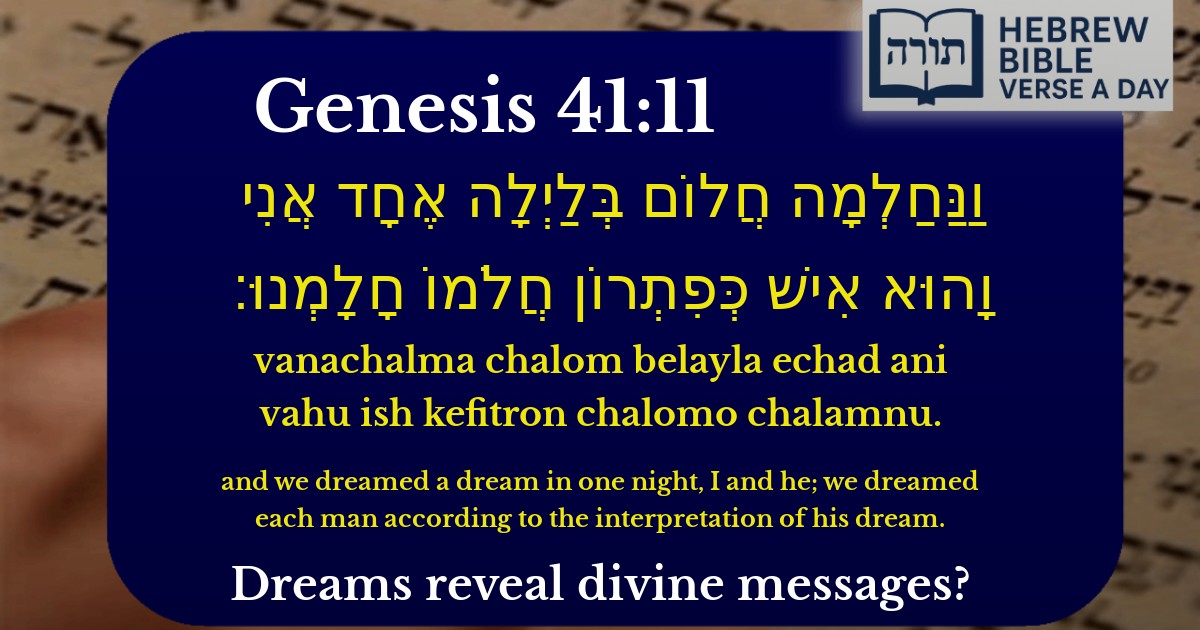Join Our Newsletter To Be Informed When New Videos Are Posted
Join the thousands of fellow Studends who rely on our videos to learn how to read the bible in Hebrew for free!
Hebrew Text
וַנַּחַלְמָה חֲלוֹם בְּלַיְלָה אֶחָד אֲנִי וָהוּא אִישׁ כְּפִתְרוֹן חֲלֹמוֹ חָלָמְנוּ׃
English Translation
and we dreamed a dream in one night, I and he; we dreamed each man according to the interpretation of his dream.
Transliteration
Vanachalma chalom belayla echad ani vahu ish kefitron chalomo chalamnu.
Hebrew Leining Text
וַנַּֽחַלְמָ֥ה חֲל֛וֹם בְּלַ֥יְלָה אֶחָ֖ד אֲנִ֣י וָה֑וּא אִ֛ישׁ כְּפִתְר֥וֹן חֲלֹמ֖וֹ חָלָֽמְנוּ׃
וַנַּֽחַלְמָ֥ה חֲל֛וֹם בְּלַ֥יְלָה אֶחָ֖ד אֲנִ֣י וָה֑וּא אִ֛ישׁ כְּפִתְר֥וֹן חֲלֹמ֖וֹ חָלָֽמְנוּ׃
🎵 Listen to leining
Parasha Commentary
📚 Talmud Citations
This verse is quoted in the Talmud.
📖 Berakhot 55b
The verse is referenced in a discussion about dreams and their interpretations, illustrating how different individuals can have the same dream but with different meanings.


Context of the Verse
This verse (Bereshit 41:11) is spoken by Pharaoh’s chief cupbearer as he recounts his experience in prison with Yosef (Joseph). He describes how he and the chief baker each had a dream on the same night, and Yosef correctly interpreted their dreams. The phrase "אִישׁ כְּפִתְרוֹן חֲלֹמוֹ" ("each man according to the interpretation of his dream") emphasizes that their dreams were unique and required individualized interpretations.
Rashi’s Explanation
Rashi (Rabbi Shlomo Yitzchaki) comments on this verse, noting that the cupbearer highlights the accuracy of Yosef’s interpretations. He explains that the phrase "אִישׁ כְּפִתְרוֹן חֲלֹמוֹ" means each dream was interpreted precisely as it unfolded in reality. This underscores Yosef’s divine wisdom in dream interpretation, which was not mere guesswork but a true understanding from Hashem.
Midrashic Insights
The Midrash (Bereshit Rabbah 89:7) elaborates on the significance of the dreams occurring "בְּלַיְלָה אֶחָד" ("in one night"). It teaches that this timing symbolizes the unity of divine providence—both dreams were part of a single divine plan leading to Yosef’s eventual rise to power. The Midrash also contrasts the two dreams: the cupbearer’s dream involved life (vine and grapes), while the baker’s dream foreshadowed death (birds eating bread), demonstrating how dreams reflect a person’s spiritual state.
Rambam’s Perspective
Rambam (Maimonides), in Moreh Nevuchim (Guide for the Perplexed 2:36), discusses dreams as a medium for divine communication. He explains that true prophetic dreams, like those interpreted by Yosef, contain symbols requiring wisdom to decipher. The phrase "כְּפִתְרוֹן חֲלֹמוֹ" indicates that the interpretation was not arbitrary but aligned with the dream’s inherent meaning, as revealed through divine insight.
Key Lessons